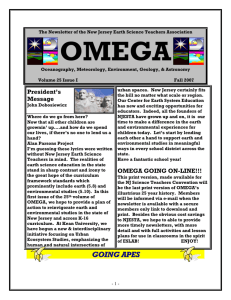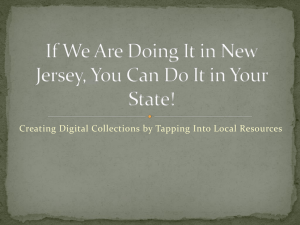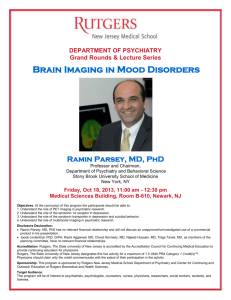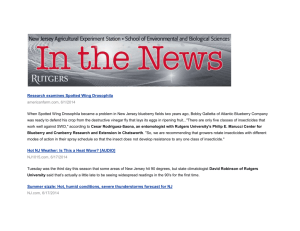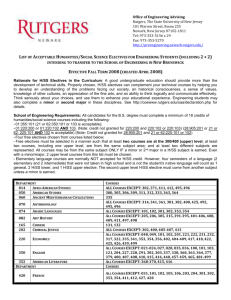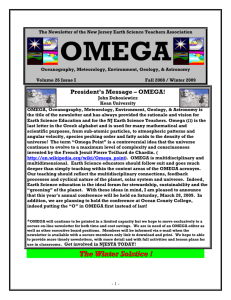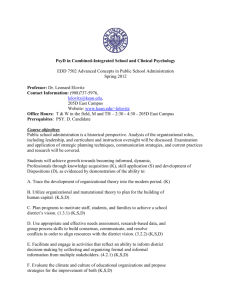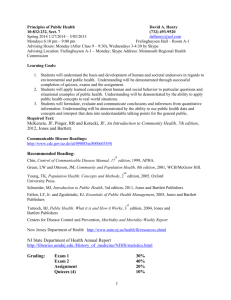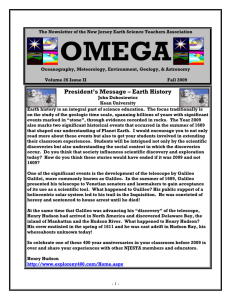Winter 2008
advertisement
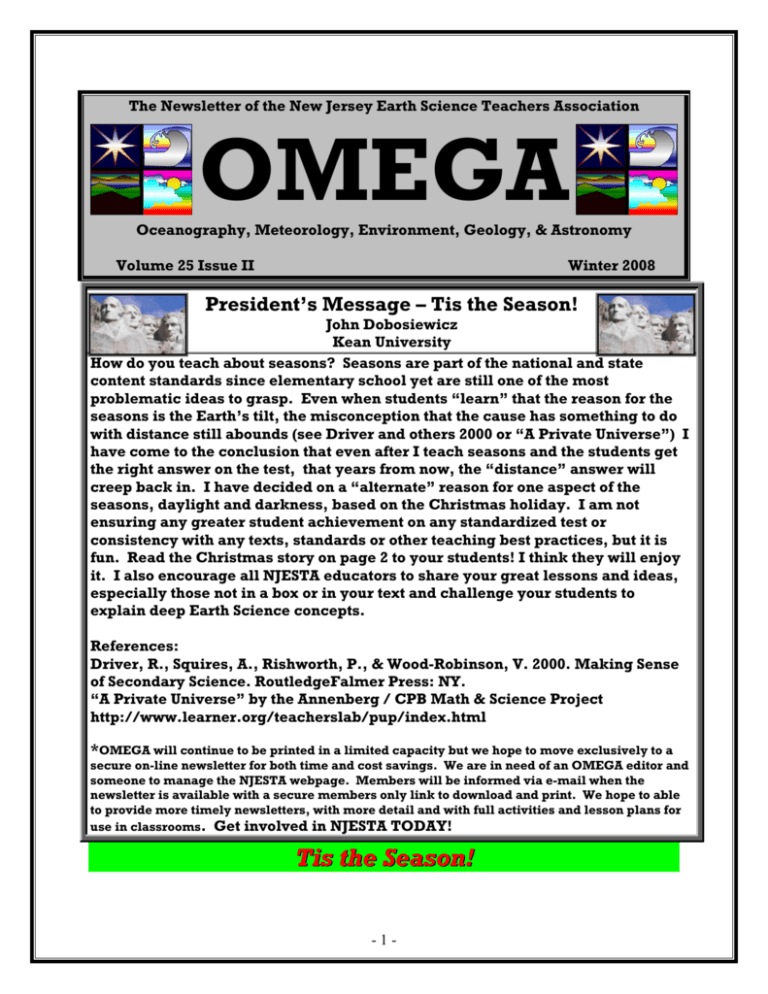
The Newsletter of the New Jersey Earth Science Teachers Association OMEGA Oceanography, Meteorology, Environment, Geology, & Astronomy Volume 25 Issue II Winter 2008 President’s Message – Tis the Season! John Dobosiewicz Kean University How do you teach about seasons? Seasons are part of the national and state content standards since elementary school yet are still one of the most problematic ideas to grasp. Even when students “learn” that the reason for the seasons is the Earth’s tilt, the misconception that the cause has something to do with distance still abounds (see Driver and others 2000 or “A Private Universe”) I have come to the conclusion that even after I teach seasons and the students get the right answer on the test, that years from now, the “distance” answer will creep back in. I have decided on a “alternate” reason for one aspect of the seasons, daylight and darkness, based on the Christmas holiday. I am not ensuring any greater student achievement on any standardized test or consistency with any texts, standards or other teaching best practices, but it is fun. Read the Christmas story on page 2 to your students! I think they will enjoy it. I also encourage all NJESTA educators to share your great lessons and ideas, especially those not in a box or in your text and challenge your students to explain deep Earth Science concepts. References: Driver, R., Squires, A., Rishworth, P., & Wood-Robinson, V. 2000. Making Sense of Secondary Science. RoutledgeFalmer Press: NY. “A Private Universe” by the Annenberg / CPB Math & Science Project http://www.learner.org/teacherslab/pup/index.html *OMEGA will continue to be printed in a limited capacity but we hope to move exclusively to a secure on-line newsletter for both time and cost savings. We are in need of an OMEGA editor and someone to manage the NJESTA webpage. Members will be informed via e-mail when the newsletter is available with a secure members only link to download and print. We hope to able to provide more timely newsletters, with more detail and with full activities and lesson plans for use in classrooms. Get involved in NJESTA TODAY! Tis the Season! -1- The story begins with Christmas Eve and the winter solstice (a connection made in early calendars if you want to make this more technical). The North Pole is in complete darkness. This is why Rudolph had a shiny red nose! Most children in the world, including the 2 billion plus in China and India live in the Northern Hemisphere which has the least amount of daylight. This gives Santa Claus the most amount of time to deliver the presents! The North Pole will remain in darkness until the vernal equinox about 3 months later, so what does Santa and all the elves do? They sleep and no one is watching the list of naughty and nice children! That is why teaching after the Christmas break is a nightmare, your kids know this! On the vernal equinox, everyplace has 12 hours of daylight and 12 hours of darkness. So this means that at noon, the sunrises at the North Pole and Santa and all the elves get up. The North Pole will stay in daylight for 6 months, past the summer solstice (Santa has no time to go to the beach anyway!) This is the time when the list is checked and gifts are made. Probably makes sense to all the early Christmas shoppers you know! (This last line I’ve never used the shopping line before, each time I tell the story it seems a new idea connection comes out!). The sun sets at noon on the autumnal equinox and the North Pole will remain dark for 6 months. So what does Santa do? He wraps the presents! And since there is no daylight, what does Santa need? He needs Christmas Lights! THE END! -2- Earthwatch Fellowships for New Jersey Educators Through our partnership with Geraldine R. Dodge Foundation, Earthwatch is pleased to offer Educators in New Jersey the opportunity to participate in scientific field research during 2008. Earthwatch expeditions are one-to three-week field research projects within the U.S. and abroad. As a fellow you will work side by side with a Scientist conducting field research. You do not need any special skills or training to join an expedition; just a sense of adventure and willingness to lend a hand! All educators in New Jersey are eligible for the fellowship which covers all costs associated with the research, food and accommodations. Upon completion all fellowship requirements, fellows will be awarded a moderate reimbursement for travel to and from the site. Applications should be sent as soon as possible, and no later than February 15th. For the most up to date information and to apply, visit us on the web at: http://www.earthwatch.org/fellowships/GRDodge.html EARTH SCIENCE @ KEAN DON’T FORGET!!!!! th 25 Annual NJESTA CONFERENCE Date: Saturday April 5, 2008 Environmental Science and the Earth System DEPARTMENT OF GEOLOGY & METEOROLOGY LOOK FOR GRADUATE COURSES IN SPRING AND SUMMER 2008! http://hurri.kean.edu http://hurri.kean.edu/cese/ Check out the new website for the Center for Earth System Education at Kean University. Look for Round Table Earth in Spring 2008! -3- INSTITUTE FOR URBAN ECOSYSTEM STUDIES at KEAN UNIVERSITY The mission of the Institute for Urban Ecosystem Studies (IUES) is consistent withthe overall mission of Kean Universityand its goal is to prepare students to thinkcritically and creatively so that they canadapt to changing social, economic andtechnological conditions, particularly asthey pertain to urban ecosystems. Themission statement of IUES emphasizesthat IUES provides a setting conducive tointerdisciplinary discourse that leads toinvestigations of both the basic andapplied aspects of urban ecology. By encouraging community-based land stewardship and environmental education and engaging in research in the natural,applied and health sciences, IUES aims to further understand and foster the biodiversity of urban environmental systems. Project ASTRO NOVA: Bringing Astronomers into New Jersey Classrooms since 1998 Project ASTRO is a National Program that creates long-term partnerships between astronomers and teachers. The New Jersey Astronomy Center (NJACE) hosts the New Jersey Project ASTRO NOVA program. Now in its tenth year, Project ASTRO NOVA has already trained over 220 teachers, partnered them with over 120 astronomers, and reached over 40,000 New Jersey students. Each year it pairs K-12 teachers with visiting volunteer astronomers who have an interest in working with local schools and community organizations. The astronomer is a resource for the teacher and provides students with the unique opportunity to interact with a scientist. The training workshop is scheduled for Friday-Saturday February 1-2, 2008 at Raritan Valley Community College and the fee for the Training Workshop is $300. The deadline for applications is November 30, 2007. In addition to Project ASTRO training, the New Jersey Astronomy Center offers dozens of other workshops. The Fall 2007 schedule is listed below: Intro to Hands-On Astronomy 1: Moon & Solar System (Grades 5-12) – Thursday, November 1 Explore the Solar System (Grades K-4) – Tuesday, November 27 Intro to Hands-On Astronomy 2: Stars and Galaxies (Grades 5-12) – Wednesday, November 28 Gravity and Orbits in the Solar System (Grades 5-12) – Monday, December 10 Our Solar Connection (Grades 5-12) – Tuesday, December 11 For more information about Project ASTRO or other NJACE astronomy workshops, call Theresa Moody at 908-526-1200 x 8942. Application forms and more information can be obtained at www.raritanval.edu/planetarium/astronova or from the New Jersey Astronomy Center, Raritan Valley Community College, P.O. Box 3300, Somerville, NJ 08876, Fax (908) 526-7938, or email tmoody@raritanval.edu. -4- Pulse of the Planet (Pulsetalks.org) This family-friendly Saturday series brings Rutgers University scientists to Liberty Science Center to teach you things you never knew about our planet’s dominant feature: the ocean. Learn about topics ranging from microscopic organisms to climate change in fun and lively discussions and demonstrations. Following the lectures, K-12 educators will be invited to stay and participate in a two hour professional development workshops. Here you will get lesson plans and materials that will help you bring the ocean back to your classroom. Stay after the demonstrations to learn how you can take them back to your classroom and earn graduate credit from Rutgers University! Please pre-register for professional development! Mark your calendars for these important dates. Educators get professional development hours/credit. Graduate credit through online course available for a selected group, first come first served. January 26, 2008 10 am – 11 am Global Warming...It is Later than we Think… but not too Late! Dr. Anthony Broccoli , Professor Rutgers University Professional Development for K-12 Educators 11:00 am – 1:00 pm February 16, 2008 10 am – 11 am Relationships in the Ocean Dr. Paul Jivoff, Assistant Professor Rider University Professional Development for K-12 Educators 11:00 am – 1:00 pm Kathy Johnston, our Artist in Residence, will lead an art class to encourage accurate observation and illustration of marine organisms. The class will focus on relationships and connections between organisms. Workshop will be limited to 20 teachers. Pre-registration required. March 8, 2008 10 am- 11 am Life on Other Planets? Dr. Paul Falkowski, Professor, Rutgers University Professional Development for K-12 Educators 11:00 am – 1:00 pm April 19, 2008 10 am- 11 am Our Networked Ocean World Dr. Scott Glenn, Professor Rutgers University Professional Development for K-12 Educators 11:00 am – 1:00 pm May 17, 2008 10 – 11 am Spring has Sprung!... in the Ocean Dr. Kay Bidle, Professor Rutgers University Professional Development for K-12 Educators 11:00 am – 1:00 pm Pre-registration is required. -5- RUTGERS GEOLOGY MUSEUM The Rutgers University Geology Museum , which is open to the public, features exhibits on geology and anthropology, with an emphasis on the natural history of New Jersey. To arrange a group tour of the Geology Museum, pleas contact R. William Seldon at (732) 932-7243, or rwseldon@rci.rutgers.edu. There is no charge for admission and the museum even has a small rock shop! th 40 Annual OPEN HOUSE Saturday, January 26, 2008 9:00 a.m. to 4:00 p.m. PRESENTATIONS 123 Scott Hall 10:00 a.m. SAMPLING THE SEA FLOOR: What we know & how we know it” Dr. Gregory Mountain Rutgers University, New Brunswick Dept. of Earth & Planetary Sciences 11:00 a.m. THE DAWN MISSION: Exploring the Asteroids Ceres and Vesta Dr. Harry McSween University of Tennessee Department of Earth and Planetary Sciences 2:00 p.m. CLIMATE, ENERGY, AND OUR FUTURE Dr. Paul Falkowski Rutgers University Institute of Marine and Coastal Studies and Department of Earth and Planetary Sciences 3:00 p.m. THE FIRST THREE BILLION YEARS OF EVOLUTION ON THE EARTH Dr. Andrew Knoll Harvard University Department of Earth and Planetary Sciences ROCK AND MINERAL IDENTIFICATION 202 Geological Hall MINERAL SALE 135 Scott Hall Information: William Selden, Collections Manager at (732) 932-7243 rwselden@rci.rutgers.edu The Museum entrance is the iron gate on the corner of George and Somerset Street in New Brunswick, NJ. ALL EVENTS FREE NO REGISTRATION PLEASE POST Edu cato rs who attend Museum presentations can receive credit toward their professional development requirements. The Geology Museum is registered as a Provider with the NJ Department of Education. Visit the Dynamic Earth Exhibit Live or virtually! http://newarkmuseum.org Or take your students to a planetarium show Go to Collections Æ Natural Sciences Æ Dynamic Earth or Planetarium -6- NJESTA Dept. of Geology & Meteorology Kean University Union, NJ 07083 stamp label NJESTA EXECUTIVE BOARD 2007 Members at Large NJSTA Liaison: Missy Holzer Chatham H.S. mholzer@monmouth.com President / OMEGA Editor John Dobosiewicz Kean University jdobosie@kean.edu Past President: Christopher Roemmele Chatham M.S. croems@comcast.net President-Elect: Vacant until 2008 Election Secretary: Angela Best Chatham M.S. abest@chatham-nj.org Membership: Kelley DeRosa Summit M.S. kderosa8@aol.com Educational Outreach: Susan Petroulas Newark Museum spetroulas@newarkmuseum.org Constitution Chair: Hope Kowalski-Porta Kinnelon H.S. kowalskih@optonline.net Treasurer: Christine Cirtain Toms River H.S. cgirtain@trschools.com WebMaster: Vacant Center for Earth System Education Paul Croft Kean University pcroft@kean.edu -7-
